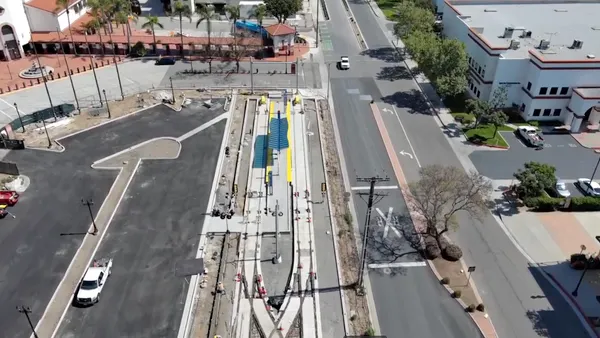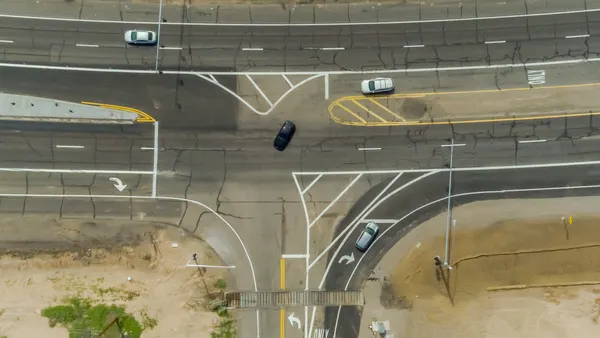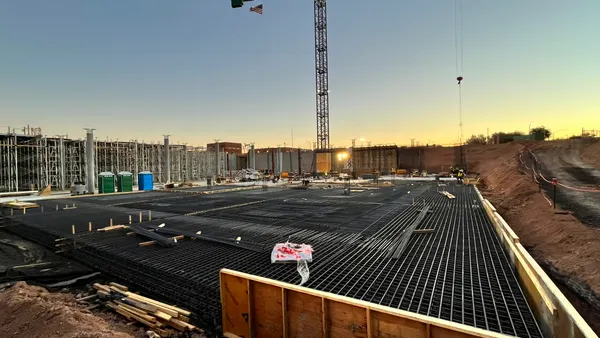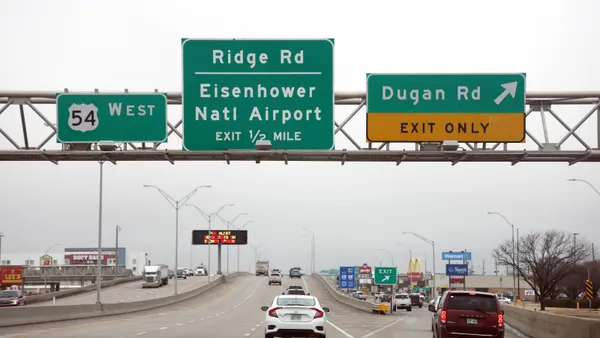UPDATE: Dec. 17, 2019: The Department of Defense's Inspector General last week, in response to Rep. Bennie G. Thompson's (D-MS) Dec. 4 request, has agreed to investigate the $400 million contract that the United States Army Corps of Engineers awarded to contractor Fisher Sand & Gravel in order to determine if the Army Corps followed procedure and whether the decision to give Fisher the contract was subject to "inappropriate influence."
In his letter to Thompson, Glenn A. Fine, principal deputy inspector general, wrote that the IG's office would announce the audit soon and then provide him with a copy of the report when its evaluation is complete.
UPDATE: Dec. 5, 2019: Yesterday, Rep. Bennie G. Thompson (D-MS), chairman of the Committee on Homeland Security, requested a review of the U.S. Army Corps of Engineers' contract with Fisher Sand & Gravel, saying that it's a company that President Trump has "frequently touted."
In the letter to the Department of Defense Office of the Inspector General, Thompson said several recent actions have raised "concerns about the possibility of inappropriate influence on USACE's contracting decision."
He noted that although the USACE has awarded multiple construction contracts since 2017 valued at more than $2.5 billion, Fisher Sand & Gravel has not been tapped because its proposals reportedly did not meet the operational requirements and its prototype project came in late and over budget.
Nevertheless, he wrote, President Trump has personally repeatedly urged USACE to award construction contracts to Fisher Sand and Gravel Co. and Jared Kushner, whom President Trump recently named as the White House lead for border construction projects, has also reportedly supported the company’s selection.
"Moreover, Department of Homeland Security officials — including acting Secretary Chad Wolf — toured a private border barrier being constructed by Fisher Sand and Gravel Co. just over a week before USACE awarded the $400 million construction contract," the letter states.
Thompson requested that the Inspector General review the award to ensure that the bid met the solicitation standards and that USACE made the award in accordance with federal procurement law and regulations.
Dive Brief:
- The U.S. Army Corps of Engineers announced this week that North Dakota-based Fisher Sand & Gravel Co. has been awarded a design-build, firm-fixed-price contract worth $400 million for construction of a border wall segment in Yuma County, Arizona. More than $268 million in funding for the project, from 2018 military defense funds, was obligated at the time of the award.
- The project, located along the southern perimeter of the Cabeza Prieta National Wildlife Refuge, is approximately 31 miles, according to a report from United Press International, and is scheduled for completion in December 2020. In September, the Interior Dept. transferred a total of 560 acres, including 300 acres within Cabeza Prieta, according to The National Wildlife Refuge Association.
- The Army Corps received three bids for the project. Fisher's selection won praise from at least two North Dakota lawmakers, Republican Senators John Hoeven and Kevin Cramer.
Dive Insight:
“I am glad to see more progress being made to secure the southern border," Cramer said in a statement on his website, "and I am grateful to see a good North Dakota company like Fisher Industries getting some of the work. I know they will do very well, performing high-quality work at a good bargain, all for the security of the people of the United States.”
Fisher had early involvement with President Donald Trump's border wall plans as one of the firms selected to build prototypes on a site in San Diego in 2017. Since then, Fisher has attempted to secure other wall projects but ended up filing a complaint with the U.S. Government Accountability Office (GAO) earlier this year alleging that the Army Corps' procurement process was unfair.
According to Fisher's complaint, bidders for border wall contracts had to prove five years' worth of experience with these types of projects, but there were only two companies that could meet that requirement — SLS Ltd. and Barnard Construction Co. The lawsuit alleges that these companies ended up negotiating contracts with inflated amounts and did not provide the best value for taxpayers. As part of an injunction request in federal court, Fisher alleged that this restriction allowed SLS and Barnard to negotiate bloated contracts that did not provide the American taxpayer with the best deal.
In fact, Fisher has since offered to construct 234 miles of border infrastructure — a mix of border and levee walls — through the Rio Grande Valley of Texas for $1.4 billion. Add $2.9 billion to that figure, Fisher said, and the company could also include paved roads, border security technology and a warranty.
The Army Corps ended up canceling a $187 million contract with Barnard as a result of Fisher's protest.
Fisher has also participated in privately funded border wall projects for the Florida-based organization We Build the Wall, which is classified by the Internal Revenue Service as a 501(c)(4) nonprofit social welfare organization. So far the group has raised more than $25 million via a GoFundMe campaign.
Fisher constructed the first one mile to one-and-a-half-mile segment for the group in Sunland, New Mexico, out of 18-foot-high sections of steel bollard fencing during the 2019 Memorial Day holiday weekend at a cost of between $6 million and $8 million. After a brief disagreement with the United States Section of the International Boundary and Water Commission (USIBWC) over a gate that the agency alleged blocked workers from servicing a nearby dam, the two reached an agreement to keep the gate locked only at night.
The group started clearing land in preparation for the second 3.5-mile section of wall last month. Despite reports to the contrary, We Build the Wall founder Brian Kolfage in a press release sent to Construction Dive said the organization will not proceed with construction until it secures approval from the USIBWC.
On Tuesday, a Hidalgo County judge approved the National Butterfly Center's request for a temporary restraining order prohibiting construction in the site's flood zone. A hearing is set for Dec. 17 as to the center's application for a temporary injunction. The center claims that construction would redirect floodwaters and damage its property.













